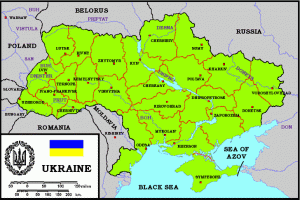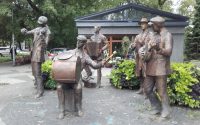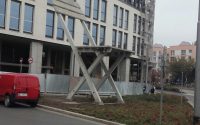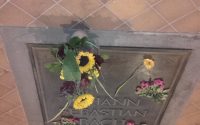Ukraine – New Country Old Problems
So it was that in 2014, I landed in a country where a civil war was in full rage, but first I will put what I knew about Ukraine into the context of my visit there.
Ukraine became independent in 1991 after Russia, Ukraine and Belarus decided to dissolve the USSR. For the next ten or so years very little news was broadcast from Ukraine, not because there was strict censorship of the press and radio, but because, for the West, only news from the newly formed Russian Federation seemed to be worth reporting. Ukraine, the narrative went, was immersed in allegations of corruption, vote-rigging at elections and excessive power of oligarchs. It gave the appearance of a new country, freed from centuries of domination, that did not know what to do with itself. What did happen, to address this inertia, was a new constitution, which was drafted with the help of the Poles. There is an anecdote, whether or not it’s true, that the Ukrainians writing the constitution asked their Polish counterparts what in their opinion was a manageable amount of corruption that should be tolerated. The Poles allegedly asked, what percentage did they have in mind. 10% came the reply, to which the Poles answered, well make that clear when you write your constitution ! Leaders came and went each, armed with promises of a bright new tomorrow, without the slightest notion of how all this might be realised.
Looming over this lurked Ukraine’s very split personality. The western part has a closer affinity with it’s neighbours, Poland, Slovakia, Hungary and Romania, and the eastern part which has always looked to Russia. It’s so contorted, that many Russian speaking Ukrainians want a looser relationship with Russia and closer a one with the West.

Ukraine finally made headline news in the West in 2004 with the attempted assassination, by poisoning, of a presidential candidate Viktor Yushchenko. You may remember images of him on television, his face bearing the scars of the poison. Thus began the Orange Revolution https://en.wikipedia.org/wiki/Orange_Revolution which ended with Yushchenko becoming President. But that did not settle the matter and allies within the Orange Revolution movement began to fall out. Yushchenko was ousted as his party’s candidate by the Prime Minister at the time, Yulia Tymoshenko who was subsequently defeated in the Presidential Election by Viktor Yanukovych who was adjudged to have been involved in vote-rigging in 2004 and whose victory over Yushchenko was declared void! . Yanukovych then attempted a balancing act between the EU and Russia and agreed to form a partnership with the EU much to Russia’s chagrin, but withdrew from the commitment at the last minute. Pro-West Ukrainians demonstrated on the streets of all the major cities of west Ukraine clashing with riot police and security forces resulting in deaths on both sides. This came to be known as ‘Euromaidan’ https://en.wikipedia.org/wiki/Euromaidan. Yanukovych, encouraged by Poland and Germany to sign the agreement did so, but too late to save his position and he fled Ukraine, allegedly entering Russia. The pro-Russian east of Ukraine erupted also, and so began a civil war, which became too fierce that it was feared it might involve Russia and the EU. To this day there remains an uneasy ceasefire with sporadic incidents of violence.

I should explain how from Russia’s point of view, it is so nervous about Ukraine drifting to the West. I stress that this is not my personal opinion, just factual. Look at any map of eastern Europe and you will see that from Poland’s eastern border with Belarus moving eastward, there are few natural barriers until the River Volga is reached. From the River Vistula in Poland, to the River Volga in Russia, lies a vast plain. Russia has always felt itself vulnerable to invasion and did indeed endure two major incursions, by Napoleon’s France in 1812 and then by Hitler’s Nazi Germany in 1941. Both invasions, particularly the latter caught respectively the Russian Empire and the USSR off guard and the results of both invasions, particularly the latter, were devastating. In 1940 USSR annexed the independent Baltic countries, Lithuania, Latvia and Estonia, and in 1945 installed sympathetic regimes in Poland, East Germany, Czechoslovakia, Romania, Bulgaria, Hungary and Albania, giving rise to the term the ‘Iron Curtain’. Whilst this certainly resembled a takeover, Russians looked on it as protecting the territory of ‘Mother Russia’. The nearest enemy guns were a thousand miles away. Ukraine and Belarus already in the USSR were also looked upon by the Russians as part of that shield. Finland and Austria very nearly fell behind that shield but in the end the USSR accepted the neutrality of both countries. When in 1991, the USSR was dissolved, Poland, Lithuania, Latvia, Estonia, Czech Republic, Slovakia (the split of the old Czechoslovakia), Hungary, Romania, Bulgaria and Albania rushed to join NATO, the western military alliances. For the Russians, potential enemies, were now at the borders of Belarus and Ukraine, so when the latter moved closer to the west, this was too much. Tension between Russia and Ukraine continues to this day.
In the midst of all of this, in Britain two referendums loomed, the first for Scottish Independence and the second which was being mooted for two years later by the British Conservative country, for remaining or leaving the EU. I was very sanguine about the first but spooked by the second. I have always believed that I’m a real European and the best way to secure European citizenship in the event of a vote to leave the EU was to acquire dual nationality. Two routes were open, Polish or German citizenship. I guessed that I always had Polish citizenship through my father. There is a law in Poland, decreed in 1951, that citizenship can only be renounced by writing to the President. Although my father became a British citizen in 1953, I was certain he never renounced his Polish citizenship – and this turned out to be the case. I could have acquired German citizenship through my maternal great-grandmother through a process Germany refers to as ‘Right of Return’. This route while possible, would be more difficult than the Polish one, because I would need to find documentation. If I already have Polish citizenship why bother? In March 2014, I e-mailed the relevant government department in Ukraine to see if they could help locate my father’s birth certificate (his birthplace now being part of Ukraine). This was unsuccessful and so are my efforts with the archives in Lviv and all the parishes in Przemyślany, where I believe he was born. I joined two website groups, Kresy-Siberia and Galicia, but soon discovered that the first was largely used by Americans, Canadians, Australians of Polish descent who spent their time German and Russian bashing which I was not the least interested in joining. the Galicia website was far too political in its commentary. The only helpful information I received was from Martin Stepek in the Kresy group and Ihor Holyboroda in the Galicia group. Martin attended the same school as me and I was vaguely acquainted with his elder brother John. Ihor was a genealogist living in Lviv. I subsequently left both website groups. At this point I made the decision to go to Lviv, all the time wondering – why couldn’t my father have come from somewhere sensible? – like southern Spain, or Tuscany or even Denmark? So it was on 15th September 2014, I landed at Lviv Airport.
End


